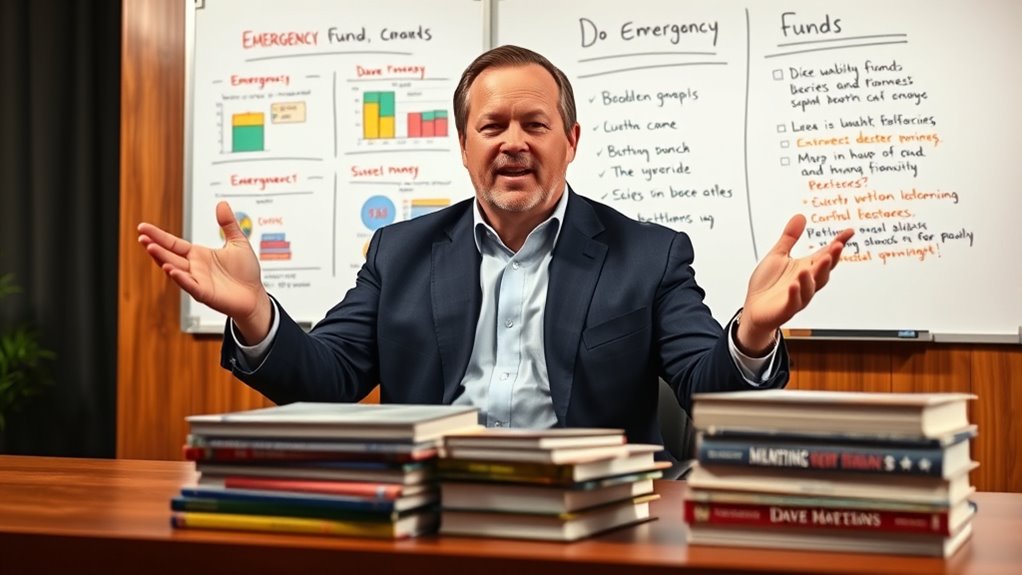According to Dave Ramsey, building an emergency fund is a vital step in financial preparedness that can save you from stress and setbacks. He recommends saving enough to cover three to six months of living expenses, starting small and automating your savings. Consistency is key, and increasing contributions over time helps you stay secure. If you want practical tips to get started and keep your finances stable, there’s more valuable guidance ahead.
Key Takeaways
- Dave Ramsey emphasizes saving 3-6 months of living expenses to create a financial safety net.
- Building an emergency fund reduces stress by preventing reliance on high-interest debt during crises.
- Consistent, automated contributions are crucial for steadily growing the emergency fund.
- Prioritizing an emergency fund helps maintain financial progress and avoid setbacks.
- Preparedness through savings enhances overall financial stability and peace of mind.

Ever wondered why a solid emergency fund is essential for financial peace of mind? The truth is, having that safety net can be a game-changer when life’s unexpected challenges arise. Without it, even small setbacks like car repairs or medical bills can throw your entire financial plan into disarray. Building an emergency fund might seem intimidating at first, but it’s a vital step that can help you stay on track with your broader financial goals, especially when it comes to investment strategies and debt management. By setting aside a specific amount of money for emergencies, you create a buffer that prevents you from relying on high-interest debt or dipping into your long-term investments in a crisis.
When you focus on establishing an emergency fund, you’re also taking control of your financial stability. It’s not just about having money set aside; it’s about understanding how to protect your progress. For example, if you’re working on eliminating debt, having that cushion means you don’t have to take on more debt just to cover unforeseen expenses. This helps you stay consistent with your debt management plan and reduces the risk of setbacks that could prolong your financial journey. Plus, an emergency fund can help you avoid the temptation to make impulsive investment decisions during stressful times, which often leads to losses or missed opportunities.
To build your emergency fund effectively, start by evaluating your monthly expenses and setting a target amount—usually enough to cover three to six months of living costs. Make regular contributions, even if they’re small at first; consistency matters more than size. Automate your savings so that a portion of your paycheck goes directly into a separate account. This way, you won’t be tempted to spend the money, and it becomes part of your routine. Over time, as your income grows or expenses decrease, increase your contributions to accelerate your progress. Additionally, understanding the importance of contrast ratio in projectors can be analogous to recognizing the importance of a balanced emergency fund—both enhance the overall quality and stability of your setup or financial plan.
Frequently Asked Questions
How Much Should I Aim to Save for My Emergency Fund?
You should aim to save three to six months’ worth of living expenses for your emergency fund. This savings milestone provides a financial cushion during unexpected events like job loss or medical emergencies. Focus on consistent contributions and strategic investment strategies to grow your fund steadily. Reaching these milestones will give you peace of mind and financial security, making it easier to handle life’s surprises without stress.
When Is the Right Time to Start Building My Emergency Fund?
The perfect time to start building your emergency fund is now—think of it as planting a seed today to enjoy a secure future tomorrow. Timing considerations and emotional readiness are key; once you’re committed, even small contributions add up. Don’t wait for a perfect moment, because life’s unpredictable. Getting started today builds confidence and peace of mind, making you better prepared for whatever surprises come your way.
Can I Use My Emergency Fund for Non-Urgent Expenses?
You shouldn’t use your emergency fund for non-urgent expenses because emergency fund misuse can lead to financial stress later. This fund is meant solely for unexpected situations like medical emergencies or job loss. Using it for non-urgent expenses weakens your safety net and can cause you to scramble for cash when real emergencies occur. Keep your emergency fund intact to ensure you’re prepared for life’s surprises, not everyday spending.
How Often Should I Review and Adjust My Emergency Fund?
You should review and adjust your emergency fund at least once a year, especially when your financial situation changes. During these reviews, consider your current investment strategies and debt management progress. If you’ve paid off debt or increased your income, you might want to boost your fund. Regularly updating guarantees you’re prepared for unexpected expenses without compromising your long-term financial goals.
What Are Common Pitfalls to Avoid When Saving for Emergencies?
You risk disaster if you ignore common pitfalls like overconfidence bias and unexpected expenses. Don’t assume your emergency fund is enough or that nothing will go wrong—these are dangerous traps. Avoid underfunding, which leaves you vulnerable, and resist the temptation to dip into your savings prematurely. Staying realistic and disciplined guarantees your emergency fund truly prepares you for life’s surprises, saving you stress when it matters most.
Conclusion
By now, you’ve learned that building an emergency fund isn’t just good advice—it’s your secret weapon against life’s unexpected twists. Think of it as your modern-day shield, much like a knight’s armor in days of old, guarding you from financial chaos. So, start saving diligently today, and remember, preparedness isn’t just for the faint of heart; it’s the ultimate way to keep calm and carry on when life throws a curveball.
Joy, as our Editor in Chief, ensures the highest standard of content. Her talent in writing is complemented by her attention to detail and passion for literature and culture. Joy’s expertise and love for the English language shine through in her editorial work, making each piece a testament to quality and clarity.










